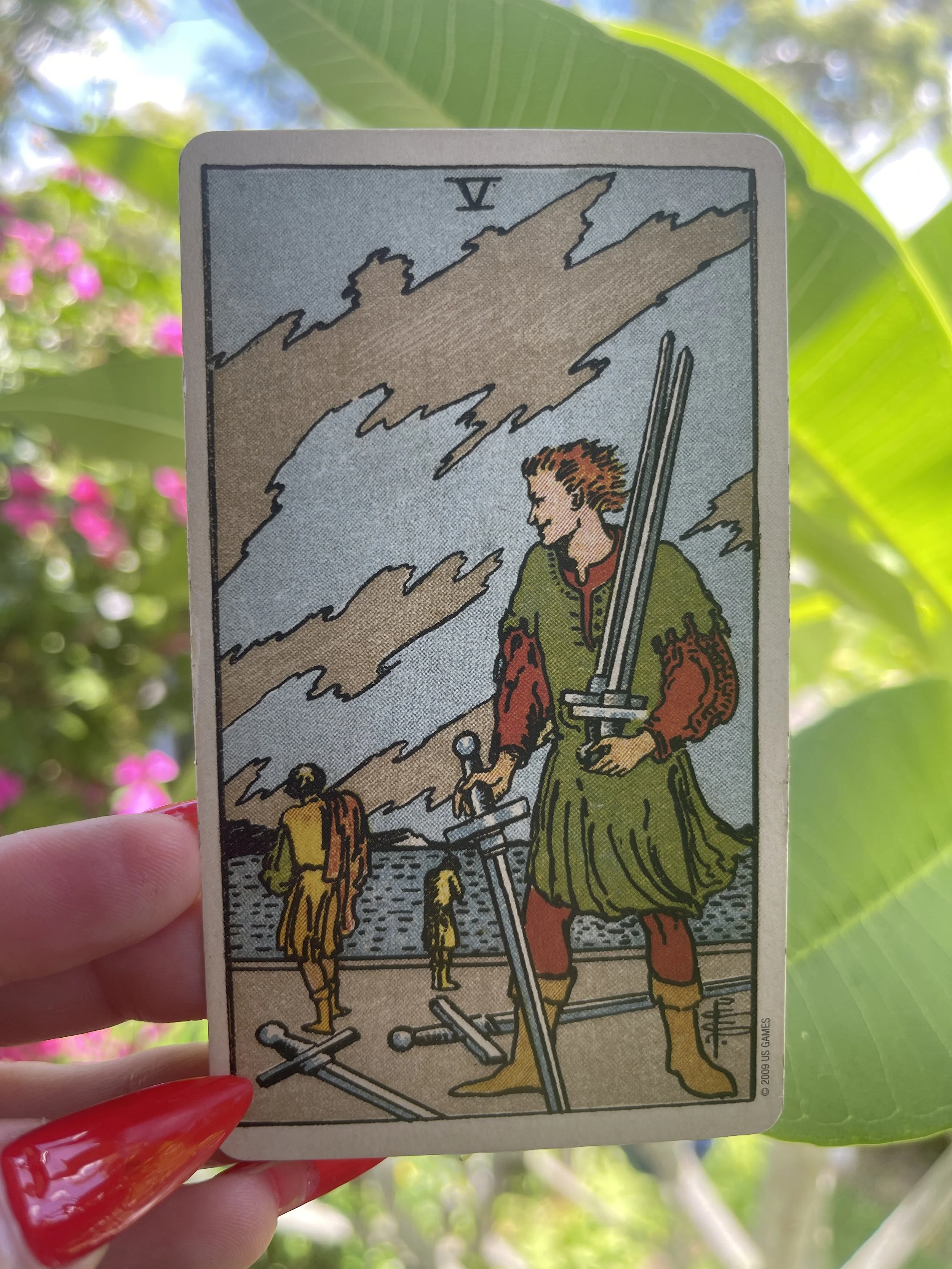5 of Swords · Win - Lose
A man stands in the foreground, holding 3 swords in his hands, while 2 swords lay at his feet. His red hair and tunic are blowing with a wind. He’s looking to the side and back with a smirk, as 2 figures retreat toward a flat but rippling body of water. One person has their head in their hands. The sky is grey with large jagged clouds.
The 5 of Swords from the Rider Waite Smith tarot.
Swords in tarot are symbolic of the mind, thoughts, and intellect.
So here we have one person talking his mouth off, or holding all the knowledge, or taking all the ideas …. and feeling good about it. Meanwhile, the other players are left sulking and skulking away. An uncomfortable dynamic where one person is taking up all the air, has all the information, credit, or benefits … and holds all the power, while others are left bereft, upset, confused.
Do I see myself in any of these characters? …. As the ‘victor’ or the ‘victims’?
Where in my personal and family life, work life, or culture is this dynamic of over-powered – underpowered one that I witness or participate it?
The scene clearly displays conflict and division. Of the mental kind. It’s very human to disagree, clash with others, and be competitive. But at the same time, I’m conscious of my visceral reaction to this card. If it ever comes up for me personally (and it does seem to come up often!), I tend to give it a cursory look, which is telling. My discomfort and avoidance probably means it’s a good theme to explore.
Because swords – mental processes - are naturally sharp and “double edged”, expect a complex of meaning that’s both direct and ambiguous at the same time.
What are the stories, beliefs, and ideas I carry around conflict, disagreement, and power?
That pleasure could be obtained in hurting or disempowering others is pathologically sadistic and narcissistic. But, in less extreme examples, it’s …
… that ego boost when you prove yourself right and someone else wrong. It’s feeling intellectually superior through befuddling, gaslighting and twisting words and the truth to win. It’s getting someone back who perhaps truly hurt you, but you take it too far – the punishment outweighs the crime.
In these cases, if you’re the person with the 5 swords … sniggering, you can bet you’re the one who’ll come off looking like a jerk.
Of the two people retreating toward the water… I see two distinct responses. The furthest … the smallest … has been deeply hurt and distressed – has no power. Meanwhile, the person in the middle ground seems to have just given up.
How you behave in words and actions during conflict teaches you about the health and responsiveness of your nervous system, and your boundary style. If you’re not conscious of that, how you are during conflict tends to be a direct reaction based on your conditioning, wounds or traumas, rather than the circumstances in front of you today.
What do my behaviours and verbal exchanges look and sound like during conflict? Do I act differently with different people or in different contexts?
What is my default boundary style? Approach ... Attack ... Retreat … Collapse?
What are the skills I can learn, develop and practice to help me articulate my thoughts, needs, desires and limits … during disagreement and conflict?
For someone who defaults to full throttle verbal attack, containment and grounding some of that bluster is key. If you’re constantly feeling the pricks and stabs from others, developing a less porous skin, and stronger core can build resilience. And then, sometimes the most empowering thing to do in circumstances that feel like ‘loose-loose’, is to cut your losses and walk away. Consciously letting go. When dealing with a bully, could that ultimately be a “winning” move?
Mendy xx
If you enjoyed this reflective practice, and would like to do more depth exploration using the tarot, consider booking an online tarot counselling session.

